Key takeaways:
- Independent publishing offers freedom and the ability to connect personally with audiences, challenging misconceptions about quality.
- Mentoring new writers fosters community and provides valuable guidance, emphasizing the importance of active listening and positive reinforcement.
- Creating supportive environments and personalizing approaches boosts writers’ confidence and spurs creativity.
- Success stories of mentees highlight the transformative impact of mentorship, showcasing growth and achievement through collaboration and guidance.
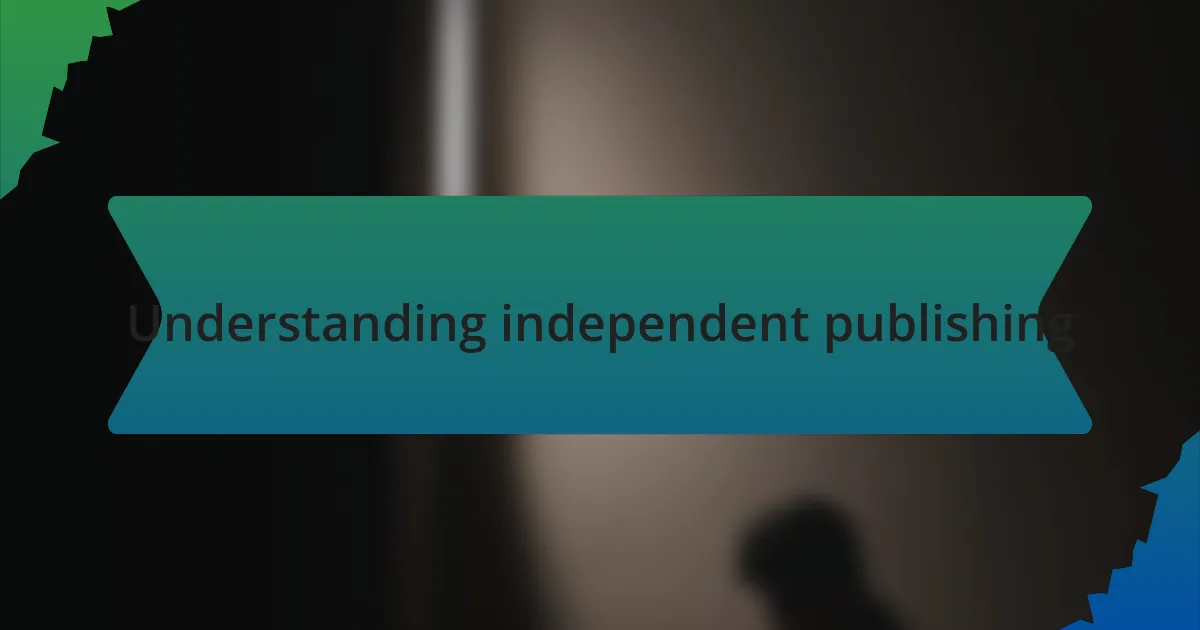
Understanding independent publishing
Independent publishing represents a revolutionary shift in the way writers bring their work to the world. I felt this transformation strongly when I released my first book outside the conventional publishing system. There’s an exhilarating freedom in creating and publishing on your terms, but it also comes with the challenge of navigating the complexities of the publishing landscape on your own.
When I first ventured into independent publishing, I found myself wondering how to attract readers without the backing of a major publisher. The excitement was palpable, but I also faced fears of obscurity. I began actively connecting with online communities, which became not just a source of support but a treasure trove of resources and strategies that helped shape my path.
Interestingly, what I’ve noticed is that many aspiring authors assume that self-publishing equals a lack of quality or professionalism. This couldn’t be further from the truth. I’ve met countless talented writers who elevate their work through meticulous editing and design, proving that independent publishing can rival traditional routes. It’s about taking ownership and forging a personal connection with your audience, which is perhaps the most rewarding part of this journey.
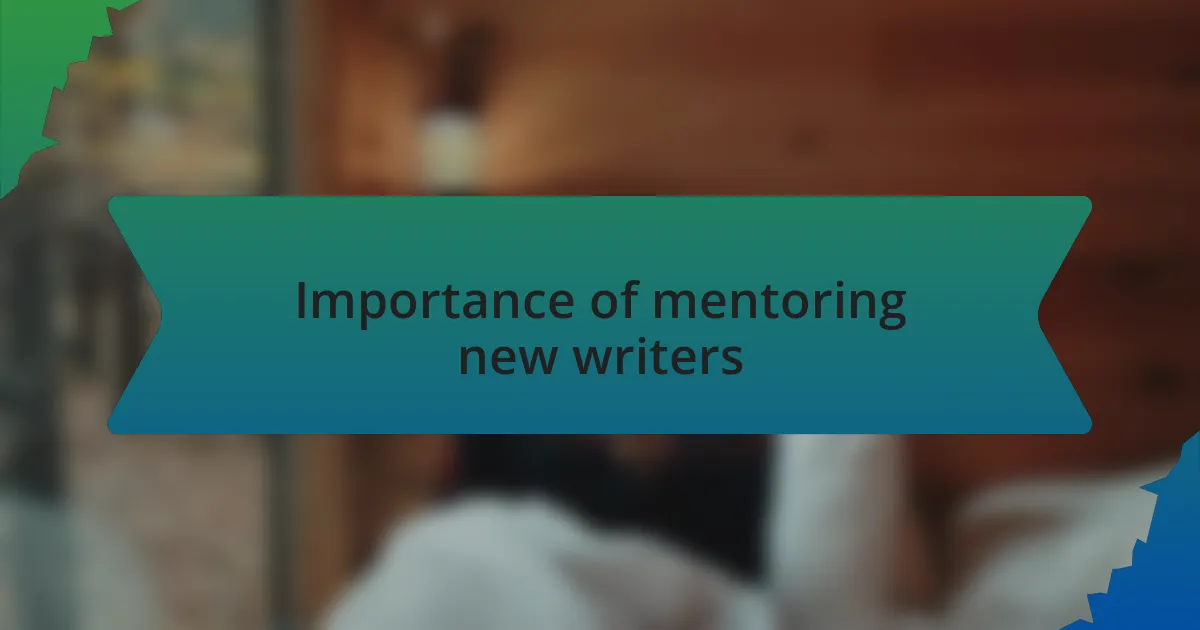
Importance of mentoring new writers
When I mentor new writers, I often reflect on my early days and the uncertainties I faced. The knowledge I gained from experienced individuals was invaluable, helping me understand the nuances of storytelling and publishing. It’s a powerful feeling to pass that torch, offering guidance that can save others from the pitfalls I encountered.
Watching new writers grow is incredibly rewarding. When they share their drafts, it’s like unwrapping a gift. I remember one mentee in particular who was hesitant to share their work. After providing constructive feedback and encouragement, their confidence soared, and they published their first short story. Seeing that transformation reminded me of the importance of fostering a supportive environment for creativity.
Mentoring isn’t just about teaching; it’s about creating a community. I often find myself learning as much, if not more, from my mentees. Their fresh perspectives and innovative ideas challenge my thinking, reminding me why I fell in love with writing in the first place. Doesn’t it make you wonder how interconnected our journeys as writers truly are?
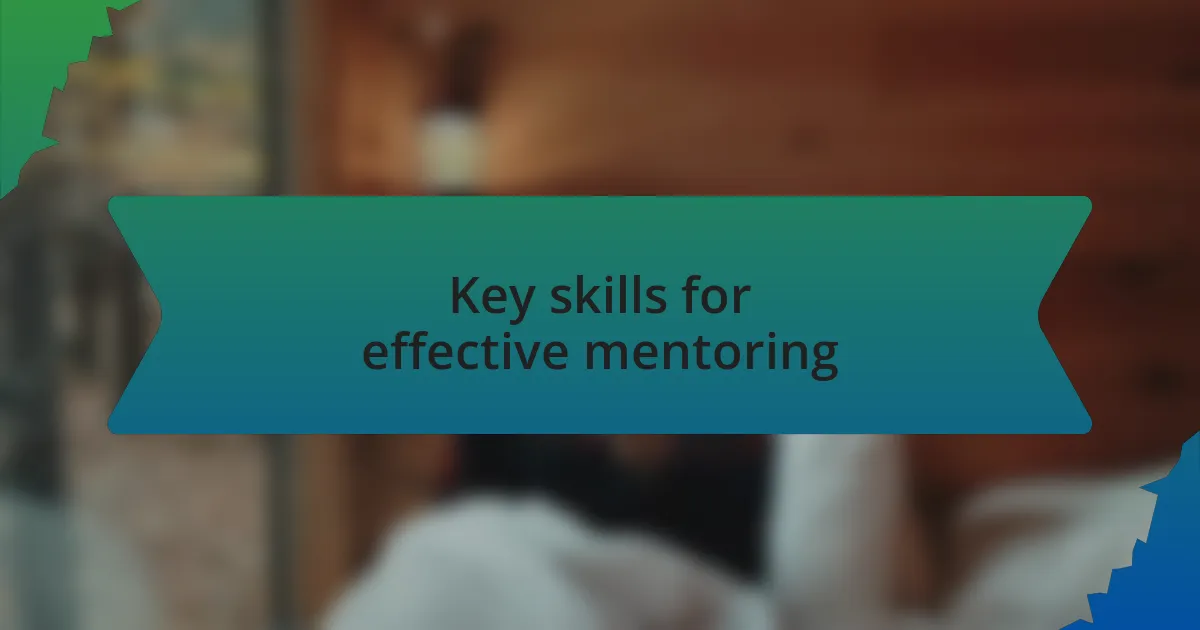
Key skills for effective mentoring
Effective mentoring hinges on several key skills that can transform the experience for both mentor and mentee. Active listening is paramount; when I engage with new writers, I make it a priority to truly hear their concerns and aspirations. It’s remarkable how often a writer feels truly valued when they know someone is paying attention. This simple act builds rapport and trust, which is essential for a productive mentoring relationship.
In my experience, offering constructive feedback is another crucial skill. I recall a time when I read a mentee’s draft filled with potential but lacking clarity. Instead of merely pointing out issues, I highlighted their strengths while guiding them on areas for improvement. This balanced approach not only helped elevate their work but also empowered them to embrace the revision process. How can we expect writers to grow if they only receive criticism?
Lastly, nurturing a growth mindset in both myself and my mentees is vital. I often encourage them to view challenges as opportunities rather than obstacles. I remember feeling intimidated by rejection letters early in my writing career, but my mentor reframed those experiences as steps towards refinement. This mindset shift not only carries through to my mentees but also deepens my resilience and enthusiasm in my own writing journey. Have you considered how your approach to setbacks can shape the writers you work with?
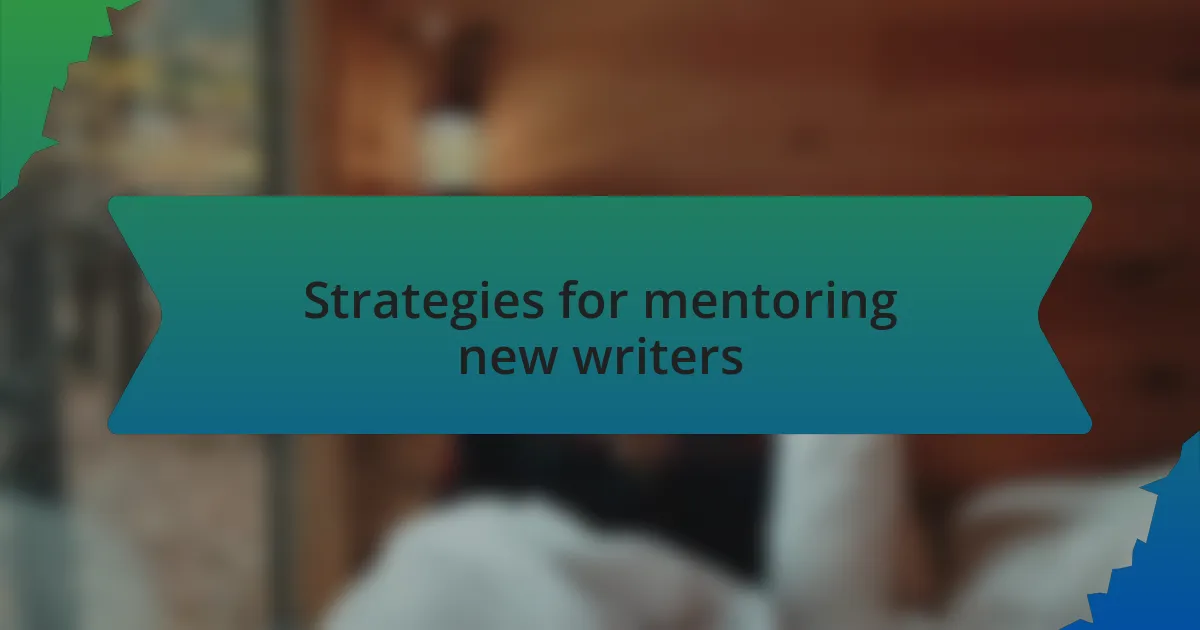
Strategies for mentoring new writers
Fostering a supportive environment is one of the strategies I find most effective when mentoring new writers. I remember hosting small group sessions where everyone felt safe to share their work. It’s incredible how a simple atmosphere of encouragement can unleash creativity. Have you ever witnessed a shy writer sparkle when they receive positive support? It’s moments like these that show the power of community in the writing process.
Another strategy is to tailor your mentoring approach to individual needs. Each writer is unique, and I always take the time to understand their specific goals and challenges. Once, I worked with a writer who struggled with pacing in their narrative. We devoted one session to dissecting the pacing of their favorite novels before diving into their draft. This personalized attention not only helped them improve their story but also built their confidence. Isn’t it fascinating how attention to individual needs can spark growth?
Finally, it’s crucial to set realistic goals and celebrate incremental achievements. I often help mentees break down their projects into manageable tasks, which can turn daunting objectives into achievable milestones. Seeing them reach these goals, no matter how small, feels rewarding on so many levels. Have you thought about how celebrating progress can fuel motivation? It’s a motivating fuel that invites writers to keep pushing forward, and I genuinely cherish being part of that journey.
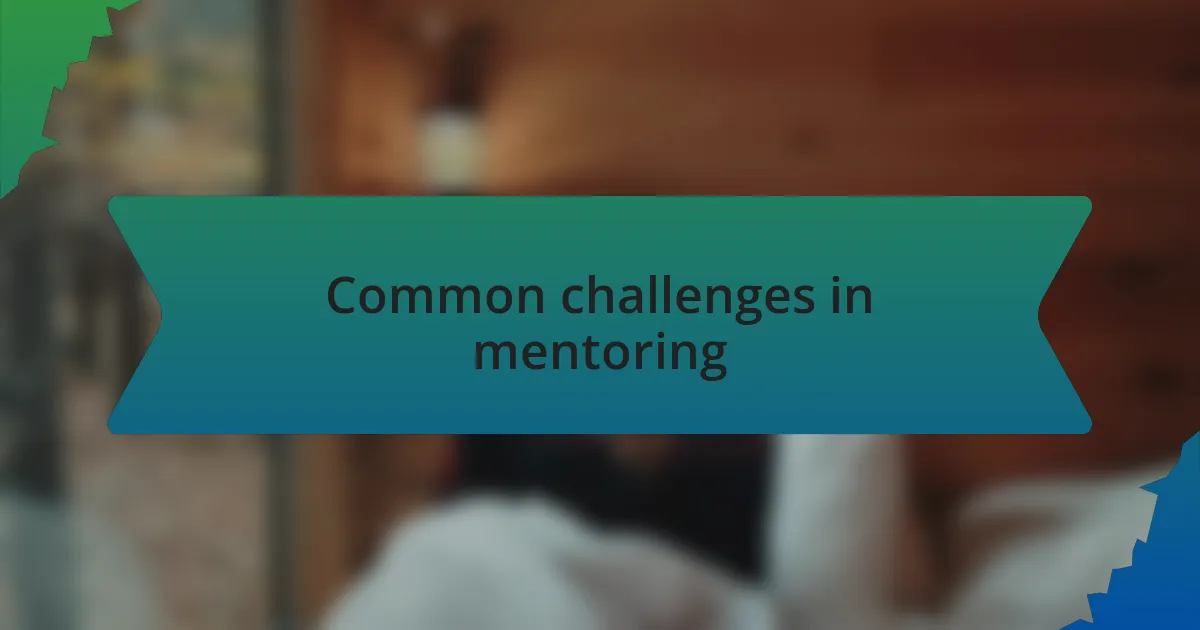
Common challenges in mentoring
One common challenge I face in mentoring new writers is balancing constructive feedback with encouragement. I recall a time when I critiqued a mentee’s piece too harshly, and it instantly dimmed their enthusiasm. It made me realize how crucial it is to frame critiques positively—how do we communicate areas for improvement without dampening their spirit? Finding that delicate balance can be tricky but remains essential for nurturing a writer’s growth.
Another challenge is managing differing expectations. I once had a mentee who believed they could finish a novel in a matter of weeks, while I knew it would take significantly longer. This disconnect can lead to frustration on both sides. It’s vital to align on what’s realistically achievable. Have you ever experienced a similar situation where hopes and reality clashed? Addressing these differences early on can help foster a more productive mentoring relationship.
Lastly, I find that maintaining ongoing motivation can be difficult for both mentor and mentee. There are times when I sense my mentees struggling with writer’s block or losing interest. I’ve learned to share my own writing struggles to remind them that it’s a shared experience. How do you keep your focus when the inspiration dwindles? Opening up about my challenges helps create a sense of camaraderie and reinforces that persistence is key in the writing journey.
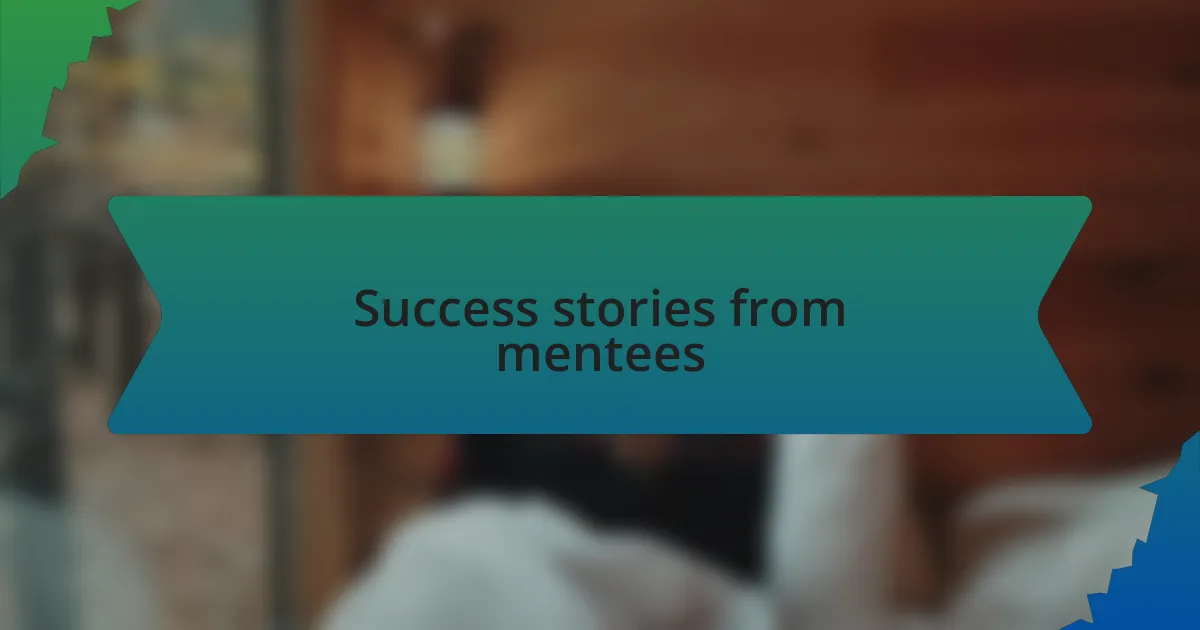
Success stories from mentees
It’s truly rewarding to see my mentees flourish. One of my favorite success stories comes from a writer who was initially hesitant to share their work. After months of nurturing their confidence, they submitted a story to a local contest and won first place. The joy in their voice when they shared the news was an unforgettable moment for both of us—how incredible it is to witness someone break through their barriers!
I also had a mentee who dreamed of publishing their first novel. Together, we worked on refining their manuscript, and after a lot of hard work, they secured a publishing deal! The elation that filled our discussions as they navigated through the process reminded me of my own early triumphs. Have you ever felt that electric excitement when a dream comes to fruition? It’s a powerful reminder of what’s possible when determination meets guidance.
Another mentee transformed their passion for poetry into a thriving blog, attracting a loyal audience. I remember their surprise when they received their first fan email! It was a moment that highlighted the importance of sharing one’s voice with the world. Can you think of a time when you took a leap and found unexpected rewards? Watching them evolve from a hesitant writer to a vibrant contributor felt like a true celebration of their hard-earned success.